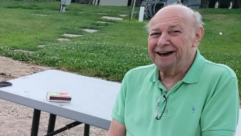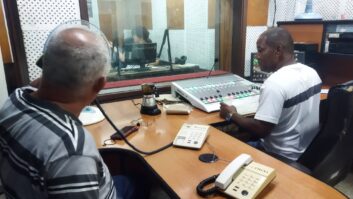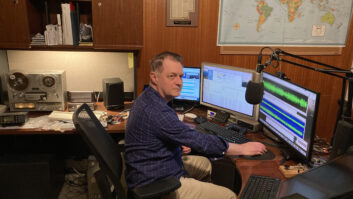Radio Martí Has a New Director With a Familiar Mission
For the heads of most radio stations, success is measured in terms of revenue. But for Jorge Luis Hernandez, success will come with the transition of one nation’s government from communism to democracy.
(click thumbnail)Jorge Luis Hernandez
That’s the lofty goal of Hernandez, the latest Director of Radio Martí, the government-run station that blasts news, information and music 24/7 at the communist-controlled island 90 miles off the tip of the Florida keys.
The Cuban — born Hernandez was selected to the post in mid — July. He is a veteran broadcast journalist from the Miami area, having previously served as the director of WOCN Union Radio, news director for WQBA La Cubanisima Radio, and most recently as media director for the city of Miami.
Hernandez understands the challenges ahead. But he comes to the position with a sense of pride and commitment.
“I think it is a privileged to me to be able to help our government in the process of promoting democracy in a critical moment for the people of Cuba.”
Foreign policy relic?
With seemingly more-immediate and dangerous threats in the Middle East and Korea, these days worrying about Cuba seems almost quaint. And Radio Martí is something of a foreign policy relic of the late 20th century.
The station was born when President Ronald Reagan made it clear he wanted to create an entity to broadcast directly into Cuba. But it wasn’t an easy birth. The Senate nixed a budget proposal in 1982. But legislation was passed the following year and on Oct. 4, 1983, Reagan signed the Radio Broadcasting to Cuba Act.
Radio MartíAlong with TV Martí, it is a part of the Office of Cuba Broadcasting, which is overseen by the U.S. International Broadcasting Bureau. Radio Marti broadcasts 24 hours a day, 7 days a week on one AM and 13 shortwave frequencies.
Based: Miami
Director: Jorge Luis Hernandez
First broadcast: May 20, 1985 from Washington, DC
Staff size: 108
2003 budget: $15.9 million
It was May 20, 1985 before Radio Martí signed on the air, broadcasting on 1160 kHz from studios in Washington.
In 1990, the Office of Cuba Broadcasting or OCB was established to oversee the operations of Radio Martí and its television counterpart, TV Martí. Four years later, the International Broadcasting Bureau was formed by the International Broadcasting Act.
This group oversees Radio and TV Martí, Voice of America, Radio Sawa and WorldNet Television and Film Service. The IBB also provides various support programs to Radio Free Europe/Radio Liberty and Radio Free Asia.
In 1996 the station moved to its current location in Miami.
Target for criticism
For an operation with such noble aims, through the years Radio Martí has received considerable scrutiny and criticism.
With the absence of the European Communist bloc and with Fidel Castro aging, some consider the effort to democratize Cuba a low priority. Given an increasing federal deficit, some critics in and out of government feel the return on investment is not as valuable as it once may have been.
The station’s operating budget for fiscal year 2003 tops $15 million at a time when Radio Martí’s audience is experiencing a serious decline. A government report in 2002 noted that Radio Martí’s audience had plummeted more than 65 percent in the previous 10 years.
Hernandez is pragmatic about the difficulties in maintaining the funding for the station, saying, “funding is always a problem no matter where you are.”
The station’s news judgment has been questioned frequently. Radio Martí has been accused of practicing substandard journalism and exhibiting a political bias in much of its programming.
The station came under heavy fire in 2001 for being late in reporting that Elian Gonzalez was taken from relatives’ home and returned to his father. Radio Martí did not report this incident, which occurred in its own backyard, for nearly four hours, lagging behind even Cuban stations.
There have been shots taken at Radio Martí’s behind-the-scenes operation, too. A former news director for Radio Martí once said in frustration that the station was “out of control and very unprofessional.”
Hernandez is more than aware of the criticism. He admits that in the past been among the critics. But he feels these are issues that can be fixed.
Outsider inside
“Until recently, I was one of those who had a view of Radio Martí from the outside. But just in a few days, from meeting the people here and having a first look at the operation inside the station, in my opinion it’s not as bad as outsiders might think.
“I’m not saying everything is perfect. We have a lot of room for improvement, but it’s not as bad as some people might say,” he said.
“We have a group of committed people here, people with a lot of experience who are very knowledgeable on the Cuban subject. I would like Radio Martí to be exactly what it is supposed to be: a professional broadcasting station that will help the government of the United States to promote democracy in Cuba. I think we can achieve that goal.”
Hernandez said among the changes he will implement is a total and complete restructuring of the station’s programming to improve the news and information services.
“We are studying the previous reports and studies we have as to how to improve our programming and make this station more credible and appreciated by the people in Cuba.”
The director realizes the monumental task ahead. Once he addresses all the internal issues, there is still a huge obstacle between Radio Martí and the successful achievement of its mission: Cuba.
Hernandez says that Cuba’s interference with Radio Martí’s signal is a top concern.
“We have very good reception in some parts of the island. But the government makes an extraordinary effort to block our signals in Havana. How to respond to the challenge of Cuba’s interference and blocking the free flow of ideas from reaching the island is, in my opinion, a priority.”
He says he will look into expanding the ways Radio Martí reaches the country.
“We broadcast in 13 different frequencies in shortwave and one frequency in AM. One way to improve the reception in Cuba would be to increase the shortwave frequencies and the AM signals that go into Cuba.”
He said the OBC streams its programming on the Internet and is exploring the use of satellites to send radio and TV signals. But he concedes that it is almost impossible to gauge how effective those methods of transmission would be.
“How many satellite dishes are in Cuba? Cuba is a country in which it is a crime to have a satellite dish unless you are a high-ranking official of the government or unless you are a tourist in one of the hotels. Otherwise, you are sent to jail. The same goes for computers. You cannot see the Internet in Cuba unless you belong to the government or unless you’re hiding it from the government.
“It’s difficult to quantify those sorts of things in a closed society like that.”
Measuring success
How will Hernandez know he’s successful?
“First, by making sure that our operation does a professional job. That we have accuracy, objectivity, balanced programming and that we have the credibility that this station should have with the people in Cuba.
“We are constantly doing focus groups with people who arrive from Cuba. We receive lots of transmission reports from every part of the island. In other words that we have credibility with the people of Cuba, so that we can do what this station was created for, which is to offer the people of Cuba a window of democracy, a reflection of what democracy is in the United States of America.
“I believe if we can achieve that, we can operate to the standards of the Voice of America or Radio Free Europe, which I think we can. We have an excellent group of people working here at the station, we have an excellent chance of achieving our goal.”
If Hernandez and Radio Martí are successful and the people of Cuba opt for a democratic government, would that political victory, in effect, put Radio Martí out of business?
“I don’t think so. Is Radio Free Europe out of business? Historically the United States has played an important role in the life of Cubans. Especially, I would say, after Castro. It’s a country that after Castro will have to build a democratic society, civil institutions and a very strong civil society without which no country would be able to succeed.
“I think the role for Radio Martí in the Cuba post-Castro will be more important than ever to let Cubans know how democracy and the free play of ideas and discussions exist in the United States. I think Radio Martí will definitely have a very important role, together with the United States government, in the future of Cuba.”













